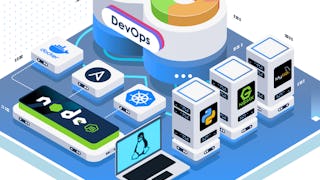- Browse
- Devops
Devops Courses
DevOps courses can help you learn continuous integration, continuous delivery, infrastructure as code, and monitoring practices. You can build skills in collaboration between development and operations teams, automation of workflows, and troubleshooting deployment issues. Many courses introduce tools like Docker for containerization, Jenkins for automation, and Kubernetes for orchestration, illustrating how these skills enhance software delivery and operational efficiency.
Popular Devops Courses and Certifications
 Status: Free TrialFree Trial
Status: Free TrialFree TrialSkills you'll gain: DevOps, Agile Methodology, Cloud-Native Computing, CI/CD, Test Driven Development (TDD), Scrum (Software Development), Behavior-Driven Development, Performance Metric, Accountability, Team Oriented, Culture Transformation, Microservices, Cross-Functional Collaboration
4.8·Rating, 4.8 out of 5 stars4.1K reviewsBeginner · Course · 1 - 3 Months
 Status: Free TrialFree TrialStatus: AI skillsAI skills
Status: Free TrialFree TrialStatus: AI skillsAI skillsSkills you'll gain: User Story, Cloud Deployment, CI/CD, Software Development Life Cycle, Open Web Application Security Project (OWASP), Continuous Integration, Istio, Linux Commands, Software Architecture, Cloud Computing Architecture, Application Deployment, Test Driven Development (TDD), Gherkin (Scripting Language), Restful API, Git (Version Control System), DevOps, Grafana, Software Engineering, Data Import/Export, Application Development
Build toward a degree
4.6·Rating, 4.6 out of 5 stars65K reviewsBeginner · Professional Certificate · 3 - 6 Months
 Status: Free TrialFree TrialK
Status: Free TrialFree TrialKKodeKloud
Skills you'll gain: Jenkins, Terraform, Infrastructure as Code (IaC), Ansible, Package and Software Management, Kubernetes, Linux Administration, Continuous Integration, CI/CD, Version Control, Linux, Docker (Software), YAML, Application Development, Linux Commands, Microservices, Devops Tools, Git (Version Control System), Data Structures, DevOps
4.6·Rating, 4.6 out of 5 stars245 reviewsBeginner · Specialization · 3 - 6 Months
 Status: Free TrialFree Trial
Status: Free TrialFree TrialSkills you'll gain: User Story, Cloud Deployment, CI/CD, Open Web Application Security Project (OWASP), Continuous Integration, Istio, Application Deployment, Test Driven Development (TDD), Gherkin (Scripting Language), Kubernetes, Jenkins, Agile Software Development, Scrum (Software Development), Code Coverage, OpenShift, DevOps, Secure Coding, Grafana, System Monitoring, Agile Methodology
Build toward a degree
4.7·Rating, 4.7 out of 5 stars7.9K reviewsIntermediate · Professional Certificate · 3 - 6 Months
 A
AAmazon Web Services
Skills you'll gain: Prompt Engineering, Amazon Bedrock, Responsible AI, Infrastructure as Code (IaC), Amazon CloudWatch, Application Deployment, Amazon Elastic Compute Cloud, CI/CD, AWS CloudFormation, Unit Testing, Continuous Deployment, Cloud Deployment, Continuous Integration, DevOps, Devops Tools, Code Review, Amazon Web Services, Serverless Computing, Containerization, Data Analysis
4.6·Rating, 4.6 out of 5 stars47 reviewsBeginner · Specialization · 1 - 3 Months
 Status: Free TrialFree Trial
Status: Free TrialFree TrialSkills you'll gain: User Story, Cloud Computing Architecture, Agile Software Development, Cloud Services, Scrum (Software Development), Cloud Deployment, Agile Methodology, Kanban Principles, DevOps, Backlogs, Cloud Security, Cloud Infrastructure, Sprint Retrospectives, Cloud Platforms, Agile Project Management, Cloud Computing, Cloud-Native Computing, Cloud Storage, CI/CD, Test Driven Development (TDD)
4.7·Rating, 4.7 out of 5 stars13K reviewsBeginner · Specialization · 3 - 6 Months
What brings you to Coursera today?
 Status: Free TrialFree TrialP
Status: Free TrialFree TrialPPackt
Skills you'll gain: Ansible, Devops Tools, Containerization, Docker (Software), Artifactory, Kubernetes, Prometheus (Software), Apache Maven, GitHub, SonarQube, CI/CD, DevOps, Continuous Integration, Version Control, Application Deployment, Build Tools, Continuous Deployment, Grafana, Application Performance Management, Continuous Delivery
4.3·Rating, 4.3 out of 5 stars23 reviewsIntermediate · Specialization · 3 - 6 Months
 Status: Free TrialFree Trial
Status: Free TrialFree TrialSkills you'll gain: CI/CD, Continuous Integration, Jenkins, DevOps, Infrastructure as Code (IaC), Continuous Delivery, OpenShift, Git (Version Control System), GitHub, IT Automation, Kubernetes, Docker (Software), Containerization, Automation, Unit Testing
4.7·Rating, 4.7 out of 5 stars246 reviewsIntermediate · Course · 1 - 3 Months
 Status: Free TrialFree Trial
Status: Free TrialFree TrialSkills you'll gain: Site Reliability Engineering, Kubernetes, Google Cloud Platform, Cloud Infrastructure, Prompt Engineering, Application Deployment, Identity and Access Management, Containerization, CI/CD, Cloud Storage, Cloud Security, Cloud Services, Cloud Management, Service Level Agreement, Virtual Machines, Microservices, Virtual Networking, Safety Culture, Culture Transformation, Service Level
4.7·Rating, 4.7 out of 5 stars54K reviewsBeginner · Professional Certificate · 3 - 6 Months
 Status: Free TrialFree Trial
Status: Free TrialFree TrialSkills you'll gain: Infrastructure as Code (IaC), AWS CloudFormation, CI/CD, Git (Version Control System), Jenkins, Ansible, Devops Tools, Version Control, Terraform, Docker (Software), Prometheus (Software), Kubernetes, DevOps, Cloud-Native Computing, Continuous Deployment, Containerization, Continuous Integration, Amazon Web Services, Software Development Tools, Configuration Management
Beginner · Specialization · 3 - 6 Months
 Status: FreeFreeA
Status: FreeFreeAAmazon Web Services
Skills you'll gain: Amazon CloudWatch, Amazon Web Services, Devops Tools, AWS Identity and Access Management (IAM), DevOps, Application Deployment
4.4·Rating, 4.4 out of 5 stars60 reviewsBeginner · Course · 1 - 4 Weeks
 Status: Free TrialFree TrialM
Status: Free TrialFree TrialMMicrosoft
Skills you'll gain: CI/CD, Azure DevOps, Continuous Integration, Cloud Deployment, Application Deployment, Microsoft Azure, Cloud Services, Continuous Deployment, DevOps, Cloud Applications, Cloud Security, Microsoft Copilot, System Monitoring, Debugging
4.1·Rating, 4.1 out of 5 stars9 reviewsBeginner · Course · 1 - 3 Months
In summary, here are 10 of our most popular devops courses
- Introduction to DevOps: IBM
- IBM DevOps and Software Engineering: IBM
- DevOps Mastery: KodeKloud
- IBM Applied DevOps Engineering: IBM
- DevOps and AI on AWS: Amazon Web Services
- IBM DevOps, Cloud, and Agile Foundations: IBM
- DevOps Complete Course: Packt
- Continuous Integration and Continuous Delivery (CI/CD): IBM
- Preparing for Google Cloud Certification: Cloud DevOps Engr: Google Cloud
- Master DevOps: CI/CD, Automation & Monitoring: Edureka
Frequently Asked Questions about Devops
DevOps is a set of practices that combines software development (Dev) and IT operations (Ops) to shorten the development lifecycle and deliver high-quality software continuously. It emphasizes collaboration, automation, and integration between development and operations teams. The importance of DevOps lies in its ability to enhance productivity, improve deployment frequency, and foster a culture of continuous improvement. By breaking down silos and encouraging communication, organizations can respond more swiftly to market demands and customer feedback, ultimately leading to better business outcomes.
A career in DevOps can open doors to various roles, including DevOps Engineer, Site Reliability Engineer (SRE), Release Manager, and Automation Architect. These positions often involve responsibilities such as managing infrastructure, automating deployment processes, and ensuring system reliability. As organizations increasingly adopt DevOps practices, the demand for skilled professionals in this field continues to grow, making it a promising career path for those interested in technology and software development.
To thrive in a DevOps role, you should develop a diverse skill set that includes both technical and soft skills. Key technical skills include proficiency in programming languages (like Python or Java), knowledge of cloud platforms (such as AWS or Azure), experience with containerization tools (like Docker and Kubernetes), and familiarity with CI/CD pipelines. Additionally, understanding version control systems (like Git) and configuration management tools (like Ansible or Puppet) is essential. Soft skills such as collaboration, problem-solving, and effective communication are equally important, as DevOps relies heavily on teamwork.
There are numerous online courses available to help you learn DevOps. Some of the best options include the IBM DevOps and Software Engineering Professional Certificate and the Preparing for Google Cloud Certification: Cloud DevOps Engineer Professional Certificate. These courses provide comprehensive training on essential DevOps practices and tools, making them great choices for anyone looking to enhance their skills in this area.
Yes. You can start learning devops on Coursera for free in two ways:
- Preview the first module of many devops courses at no cost. This includes video lessons, readings, graded assignments, and Coursera Coach (where available).
- Start a 7-day free trial for Specializations or Coursera Plus. This gives you full access to all course content across eligible programs within the timeframe of your trial.
If you want to keep learning, earn a certificate in devops, or unlock full course access after the preview or trial, you can upgrade or apply for financial aid.
Learning DevOps involves a combination of theoretical knowledge and practical experience. Start by enrolling in online courses that cover the fundamentals of DevOps practices and tools. Engage in hands-on projects to apply what you learn, such as setting up CI/CD pipelines or working with cloud services. Additionally, participating in community forums and collaborating with others can enhance your understanding and provide real-world insights. Continuous learning and staying updated with industry trends are also crucial for success in this rapidly evolving field.
Typical topics covered in DevOps courses include version control systems, continuous integration and continuous deployment (CI/CD), infrastructure as code (IaC), containerization, cloud computing, and monitoring and logging practices. Courses often explore tools like Docker, Kubernetes, Jenkins, and Terraform, as well as methodologies like Agile and Lean. By covering these topics, learners gain a comprehensive understanding of how to implement DevOps practices effectively within an organization.
For training and upskilling employees in DevOps, consider programs like the IBM Applied DevOps Engineering Professional Certificate or the DevOps: Introduction to Developer Operations Specialization. These courses are designed to equip teams with the necessary skills and knowledge to adopt DevOps practices, fostering a culture of collaboration and efficiency within the workforce.










